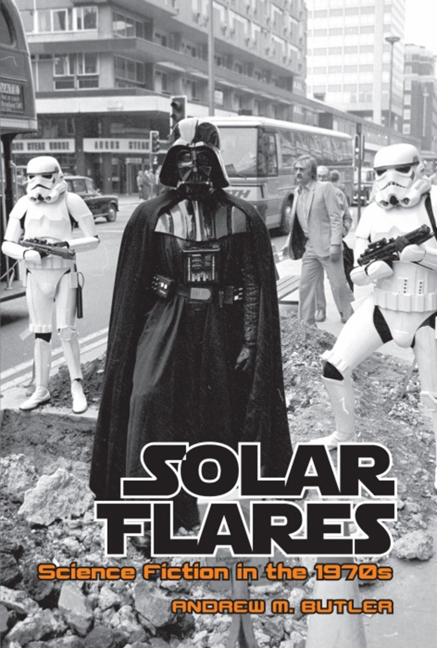Book contents
- Frontmatter
- Dedication
- Contents
- Acknowledgements
- Prologue
- 1 The Ends of First Sf: Pioneers as Veterans
- 2 After the New Wave: After Science Fiction?
- 3 Beyond Apollo: Space Fictions after the Moon Landing
- 4 Big Dumb Objects: Science Fiction as Self-Parody
- 5 The Rise of Fantasy: Swords and Planets
- 6 Home of the Extraterrestrial Brothers: Race and African American Science Fiction
- 7 Alien Invaders: Vietnam and the Counterculture
- 8 This Septic Isle: Post-Imperial Melancholy
- 9 Foul Contagion Spread: Ecology and Environmentalism
- 10 Female Counter-Literature: Feminism
- 11 Strange Bedfellows: Gay Liberation
- 12 Saving the Family? Children's Fiction
- 13 Eating the Audience: Blockbusters
- 14 Chariots of the Gods: Pseudoscience and Parental Fears
- 15 Towers of Babel: The Architecture of Sf
- 16 Ruptures: Metafiction and Postmodernism
- Epilogue
- Bibliography
- Index
15 - Towers of Babel: The Architecture of Sf
- Frontmatter
- Dedication
- Contents
- Acknowledgements
- Prologue
- 1 The Ends of First Sf: Pioneers as Veterans
- 2 After the New Wave: After Science Fiction?
- 3 Beyond Apollo: Space Fictions after the Moon Landing
- 4 Big Dumb Objects: Science Fiction as Self-Parody
- 5 The Rise of Fantasy: Swords and Planets
- 6 Home of the Extraterrestrial Brothers: Race and African American Science Fiction
- 7 Alien Invaders: Vietnam and the Counterculture
- 8 This Septic Isle: Post-Imperial Melancholy
- 9 Foul Contagion Spread: Ecology and Environmentalism
- 10 Female Counter-Literature: Feminism
- 11 Strange Bedfellows: Gay Liberation
- 12 Saving the Family? Children's Fiction
- 13 Eating the Audience: Blockbusters
- 14 Chariots of the Gods: Pseudoscience and Parental Fears
- 15 Towers of Babel: The Architecture of Sf
- 16 Ruptures: Metafiction and Postmodernism
- Epilogue
- Bibliography
- Index
Summary
Human endeavour has clearly had an impact upon the environment, especially in the creation of towns and cities, and, less obviously, in the consequent shaping of the landscape for leisure. Perhaps the most visible impact is in the form of architecture, which often has a sense of the utopian about the aspiration of the built environment. Architects work in the future and future conditional tenses – when or if this is built then this will happen. On the other hand, buildings can be monuments to the ego of the architect, planner, funder or location, or to human ambition in general, and make a signature on a landscape. The story in Genesis of the Tower of Babel, where God destroyed the tower and scattered its makers, remains a cautionary tale about overreaching and hubris, alongside the flight of Icarus and Promethean/Frankensteinian narratives. In the 1970s, fiction was more pessimistic than architectural practice, which could still imagine the marvellous city. This chapter will analyse the representation of architecture in Robert Silverberg's Tower of Glass (1970) and The World Inside (1971), the films The Towering Inferno (John Guillermin, 1974) and King Kong (John Guillermin, 1976), in J.G. Ballard's novels Crash (1973), Concrete Island (1974) and High-Rise (1975) and the film Shivers (aka Orgy of the Blood Parasites, They Came From Within, The Parasite Murders and Frissons, David Cronenberg, 1975); and the representation of theme parks and hyperreality, especially in the films Westworld (Michael Crichton, 1973) and Futureworld (Richard T. Heffron, 1976), Kit Reed's novel Magic Time (1980) and the adaptation of a bestselling novel, The Stepford Wives (Bryan Forbes, 1975). Rollerball (Norman Jewison, 1975), Death Race 2000 (Paul Bartel, 1975) and Logan's Run (Michael Anderson, 1976) feature characters in post-apocalyptic, human-made landscapes, whereas the films The Big Bus (James Frawley, 1976), The China Syndrome (James Bridges, 1979), The Chain Reaction (Ian Barry, 1980) and Colossus: The Forbin Project (Joseph Sargent, 1970) feature landscapes on the brink of radioactive disaster, and Robert Merle's Malevil (1972, trans. 1973) and Russell Hoban's Riddley Walker (1980) depict the aftermath of nuclear apocalypse.
- Type
- Chapter
- Information
- Solar FlaresScience Fiction in the 1970s, pp. 206 - 220Publisher: Liverpool University PressPrint publication year: 2012



